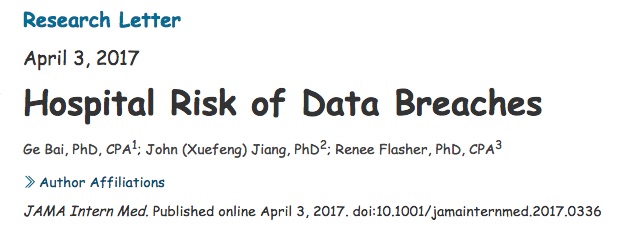 Photo: Courtesy Dartmouth College
Photo: Courtesy Dartmouth College
With over two-thirds of U.S. adults owning a smartphone, and the rise in miniaturized sensors and low-power body area networks that are used for remote health monitoring, mobile health (mHealth) is beginning to experience a boom. While the technology has the potential to increase healthcare quality, expand access to services, reduce costs, and improve personal wellness and public health, such benefits may not be fully realized unless greater privacy and security measures are implemented, according to a new paper published in the June issue of Computer. (A pdf of the paper is available upon request).
To maintain the confidentiality of patient records, healthcare providers implement their own security measures; yet, consumers may not have access to such systems for their home-based devices. To ensure that protected health information (PHI) remains confidential and secure through mHealth technologies, the authors pose a series of research challenges in the areas of: data sharing and consent management; access control and authentication; confidentiality and anonymity; mHealth smartphone apps; policies and compliance; accuracy and data provenance; and security technology.
Many mHealth systems have the ability to continuously collect and transmit individual health data – but to what end? Among the challenges, researchers highlight the need for mHealth systems to provide users with the opportunity to specify how their PHI will be used, to prevent mHealth systems from collecting information that extends beyond the clinical setting. To verify that a personal device reporting health-related information is in fact being used by the rightful owner, access control and continuous authentication measures, such as building biometric sensors into a device, are also needed. In mHealth, GPS can be used to collect information about geo-exposures, movement patterns and other data about users; however, even when GPS is turned off, there’s a risk that remote sensor data could disclose an individual’s location and other private information. Anonymizing data would help mitigate this risk.
“We encourage colleagues with research expertise in mobile health, medical devices, and secure computing to engage with these issues and help bring pervasive mobile-health technology to the world,” said lead author David Kotz, the Champion International Professor in the Department of Computer Science at Dartmouth College.
Source: Dartmouth College
http://phys.org/news/2016-07-greater-privacy-patient-info-mobile.html
Smarte Technologien und Internet der Dinge stellen Schutz der Privatheit vor neue Herausforderungen
 Bildquelle: ISI – www.forum-privatheit.de Das Fraunhofer-Institut für System- und Innovationsforschung ISI analysiert Entstehung und Auswirkungen von Innovationen. Das seit Jahrzehnten aktive ISI erforscht die kurz- und langfristigen Entwicklungen von Innovationsprozessen und die gesellschaftlichen Auswirkungen neuer Technologien und Dienstleistungen. Folgend meldet…
Bildquelle: ISI – www.forum-privatheit.de Das Fraunhofer-Institut für System- und Innovationsforschung ISI analysiert Entstehung und Auswirkungen von Innovationen. Das seit Jahrzehnten aktive ISI erforscht die kurz- und langfristigen Entwicklungen von Innovationsprozessen und die gesellschaftlichen Auswirkungen neuer Technologien und Dienstleistungen. Folgend meldet…
Internet of Things in medizinischen Geräten: Ein Disaster per Verschreibung
Text-Zitat Tom Spring: IoT Medical Devices: A Prescription for Disaster Hospitals are prime targets for hackers who see internet-connected healthcare equipment as low-hanging fruit when it comes to making a quick buck by stealing medical records, nefariously sucking up computer…
Eine weitere Studie vom 3. April 2017 aus den USA bestätigt die besorgniserregende Unsicherheit von Patientendaten in Spitätern und bei den Versicherungen:
 Read more →
Read more →
